We are very happy to announce that MGO 2024 will be from 5 – 14 August 2024, God willing.
Space is limited and interest high – so we recommend you sign up as soon as possible.
We are very happy to announce that MGO 2024 will be from 5 – 14 August 2024, God willing.
Space is limited and interest high – so we recommend you sign up as soon as possible.
We praise the Lord for His faithfulness and help during the first week of MGO 2023.
Although much smaller than most previous years, the team still managed to distribute several thousands of Seed Sower texts, and many people listened to the Gospel preached in the open air meetings.
As in former years, the prison visit on Wednesday, and the Children’s Day on Saturday were outstanding highlights.
We arrived at M* prison to the news that they had several suspected Cholera cases. A team from Headquarters was on site to assess the situation and to advise on preventative measures, so our gift of a hygiene pack for each man was particularly timely, and exceedingly welcome. Almost the entire prison complement returned from their work in the fields to listen to the Gospel being preached.
On Saturday, around 300 children were present to listen to the Gospel presentation and to enjoy the activities and games laid on for them. It is humbling to think how little it takes to brighten the lives of these most impoverished children. Pray for them.
It was an immense joy for me to sit down to break bread for the first time with the young assembly at Saidi this morning.
The Lord has really been blessing the work there. It is thrilling to see the beginnings of a spiritual harvest after years of sowing.
A big part of me would dearly have loved to be present a few weeks ago for the inaugural breaking of bread. However, I remind myself that the saints here have done exactly as I’ve always taught them they should do. That is, to seek to honour and obey the Lord, and to look to His Word alone for their guidance. To value the Lord’s presence above the presence of any missionary. And so I am glad that they did not feel that they needed a visitor’s blessing in order to begin meeting as an assembly. But I would still have loved to have been there!
Just a “large handful” of believers presently comprise the assembly. Recently, seventeen others asked for baptism and to join the fellowship. Brother Goodson has begun the process of hearing the testimonies of those interested. In conversation a couple of days ago he was telling me how impressed he is with the level of understanding of the Gospel. Many others come regularly to hear the Gospel, and today there were several new faces, as there are every week. It was a privilege to be able to share the Gospel with them… Wodala munthuyo wokhululukidwa tchimo lake; wokwiriridwa choipa chake! Blessed is he whose transgression is forgiven, whose sin is covered. Amen!
Goodson also mentioned that other nearby churches are surprised how many abambo (men) consistently attend the meetings there. Most other churches are mainly comprised of women. However, at Saidi it’s around a 50/50 split. Goodson rightly attributes to the fact that the Lord is at work.
Over the next week, we plan to have Gospel meetings at the site each afternoon. Please pray that this would be a means in the Lord’s had to reach more unsaved, and to establish those who have professed faith. The believers have distributed many invitations.
We praise the Lord for all he is doing.
In March, Cyclone Freddy wreaked havoc in Malawi, causing immense destruction and loss of life. With a total death toll of over 1000 and over 1,000,000 people displaced, the impact of the disaster was heart-wrenching. The storm destroyed thousands of hectares of mature maize, leaving communities vulnerable to hunger and economic challenges. In the face of this catastrophe, SALT tried to respond with compassion, wisdom and determination. The Lord enabled us to provide emergency aid to over 1000 people from around 10 villages.
The Lord’s people responded generously . We want to update you on our ongoing relief efforts and how we plan to continue helping those affected by Cyclone Freddy.

In the immediate aftermath of Cyclone Freddy, our team visited numerous evacuation camps, like the one at Lisao. We distributed much-needed emergency aid to the affected communities. The aid included plastic sheeting for emergency shelter, 13,500 kgs of maize flour, approximately 670 kgs of beans, and 2300 soap tablets. While we were able to provide assistance to those in need, we faced challenges as most of the evacuation camps were in school buildings, which were disbanded later, forcing people back to their villages, often with no choice but to rely on already impoverished relatives.
Recognizing the plight of vulnerable people, such as widows or those caring for orphans, we aim to construct 15 new houses, as we are able. Additionally, we plan to assist in repairing numerous other houses for vulnerable individuals in the affected villages. However, the serious economic difficulties in the country, including scarcity and soaring prices of cement and shortages of fuel, have posed significant challenges to our efforts. Nevertheless, we remain committed to providing safe and secure housing for those who need it most.


To improve long-term food security for our community, we have taken the initiative to purchase a reserve of over 12 tons of maize. We will distribute this later in the year to alleviate hunger. Moreover, we are determined to enhance our ability to respond effectively to emergencies like Cyclone Freddy in the future. With some of the funds donated, we plan to invest in an irrigation system on several acres of farmland adjacent to our site. We hope this project will significantly improve our capacity to support the needs of the community during times of crisis.
Our aim is always to keep the Gospel “front and centre”. Through all our interventions, we have had the privilege of sharing the Gospel with those we have assisted. This has had a profound impact on the affected communities. One heartwarming message of gratitude that we received reads,
“we want to thank you for the help you have given without respect of religion… the people are very grateful because you have helped more than all the other help we received and also because of the Good News which you sowed.”
The opportunity to bring comfort and the hope of the Gospel through actions and words has been the greatest blessing during this difficult time.
We continue to rebuild and provide assistance in the aftermath of Cyclone Freddy. We are deeply committed to supporting the affected communities in our vicinity. We trust that our relief efforts, though challenging, have been a testament to the power of compassion, generosity, and faith. We thank all our supporters and donors who have made this possible. With your continued support, we aim to bring lasting change and resilience to the lives of those affected by the cyclone. Together, we can rebuild hope, one step at a time.
Here at Thondwe we are in the throes of preparing for Malawi Gospel Outreach (MGO) 2023. Ordering texts. Distributing invitations. Booking accommodation. Planning activities… The list goes on.
And in the midst of all the busyness, it’s natural to start wondering if it’s worth all the effort.
Short-term mission work gets a lot of criticism. And let’s be honest, some of that is well deserved. We’ve all heard stories about ‘those people’ who go visit missionaries to ‘help’ and ‘encourage’ them and end up leaving them more worn-out and discouraged than before. Or the enthusiastic but naïve volunteers who end up committing countless cultural taboos and damaging the reputation of the work.
So what about MGO? Is it helpful or harmful? Is it worth the effort?
Well, now that I’ve experienced it from the perspective of someone on the ground, I think I can safely and unequivocally say that it is definitely worth the effort.
For one thing, it is a tremendous encouragement to the local workers.
It can get lonely down here! Of course, we have an amazing team, and we generally enjoy working together. But we miss the varied and frequent fellowship that believers experience in countries with multiple assemblies and regular Bible conferences. So, getting to spend two weeks with a group of believers, fellowshipping in the gospel, singing hymns, and talking about the Lord is a tremendous boost to us!
Not to mention the encouragement of people taking time to come and see what the Lord is doing here. It shows that the interest goes deeper than surface level, and it assures us that there are some who will be praying with a personal knowledge of what is going on.
The increase in manpower, as simple as that may sound, is also a help. With a team of believers, we are able to do different kinds of outreach than normal. Distributing several thousand texts at the market? This certainly can be done with two or three people, but it takes a lot more time and energy than when you have ten or twenty. Corralling six hundred kids for the day? Perhaps it can be done with only a few adults, but it’s certainly not advisable.
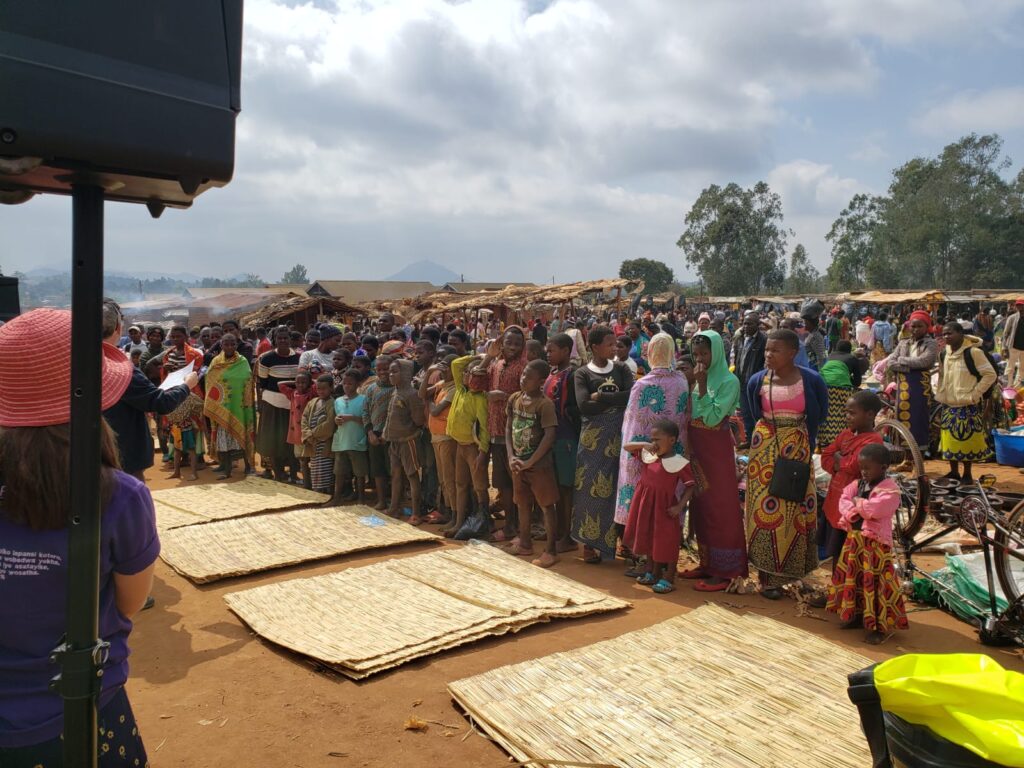
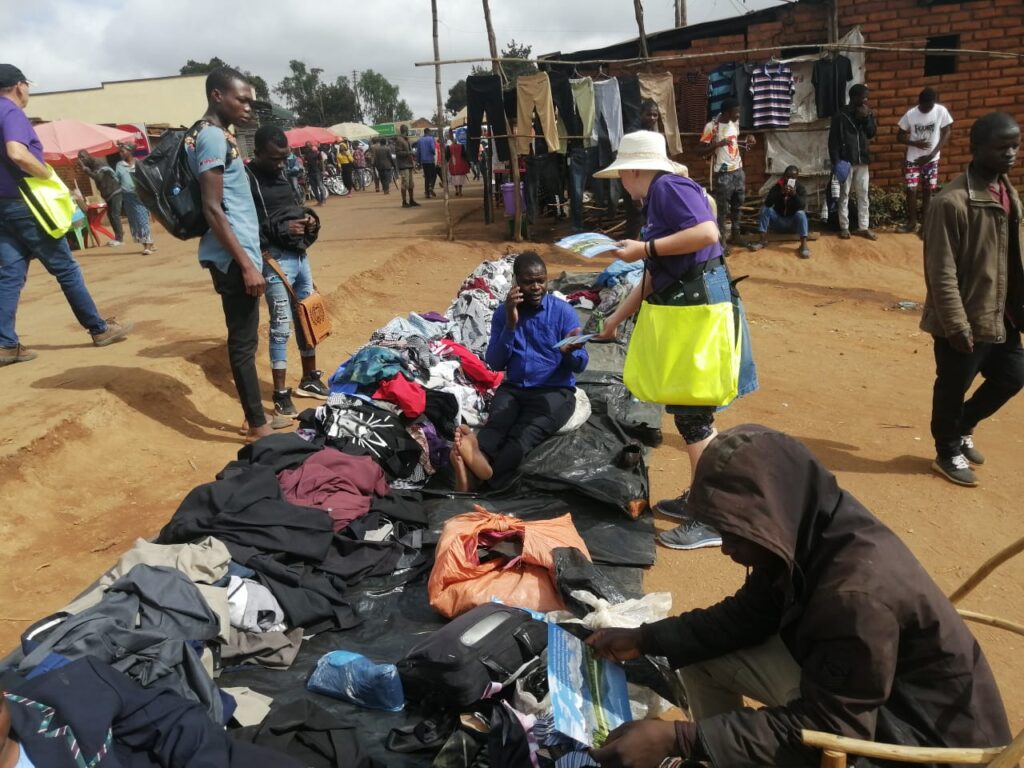
MGO makes a positive impression in the community. I was chatting with the teens in my Bible study group last night about this year’s outreach. The boys were asking about the guys who came and played football with them. Another asked about Bill, who came and helped preach the gospel. And everyone in my neighborhood remembers ‘Royce’ (Lois). Why? Because she took time to try out her Chichewa with the women and be silly with the children. It turns out you can communicate love and genuine care – two things that are often missing here – regardless of a language barrier.
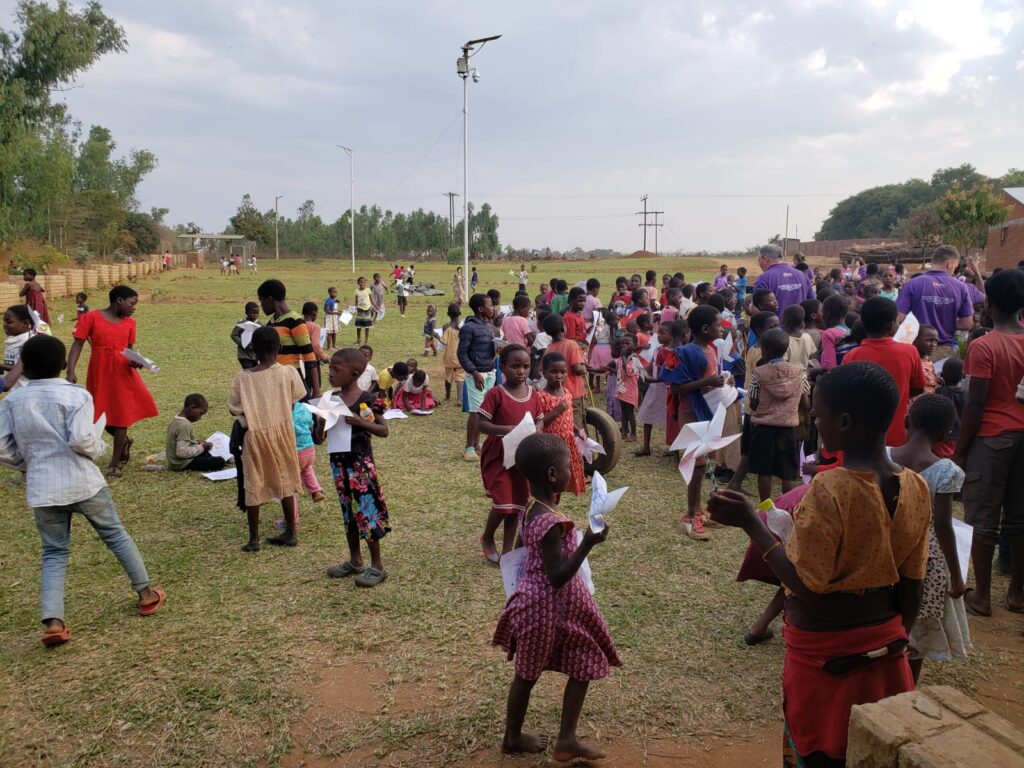
I think I can speak for the visitors too – having once been one myself – and say that it’s also an encouragement for them. While reaching others with the gospel should be the thrust of our life, there is something unique about setting apart an entire week or two for that specific purpose.
It also gives them a better understanding of the work. It strengthens the connection between supporting assemblies and missionaries/workers and leads to more intelligent and informed prayer.
I could go on, but this is already way too long. I’ll end with this: Could it also be that it might be a tool the Lord uses to raise up others for the work here? That’s what happened with me, and we’re praying that might also happen with others.
Of course, no two MGOs are the same. Different people and different activities lead to varied dynamics. So, prayer is needed and appreciated that the Lord will work in and through us all to encourage and be encouraged and unitedly spread the good news about Jesus Christ.
Life and death are much more raw in Malawi than in the West. People here accept as normal parts of life things that we take great pains to sterilize and sanitize.
Few things better exemplify this than a funeral.
Anyone who’s lived in this part of the world knows that everything stops for a funeral. As they often have no way to preserve the body, they need to attend to things promptly. There’s also an expectation that everyone in the village will attend. (That may be because of a strong sense of community. Or, because people don’t want to be accused of using witchcraft to contribute to the person’s death. It is sometimes difficult to tell). And so, the death of someone in the village today means that no one will be at work tomorrow. It’s a constant reminder that death is an interrupter, an unwanted but ever-present intrusion in life.
Nothing makes that more evident than the wailing you hear as you approach the home of the deceased person. I can’t make a blanket statement about how Westerners grieve. After all I’ve heard that my Italian ancestors knew how to do justice to the whole wailing thing. But most of the funerals I’ve been to have been quiet affairs. The family and friends of the deceased silently weep. Those in attendance offer their condolences in hushed voices and whispers. That’s not how things are done here. The wailing starts long before the funeral and it continues throughout, as the women of the family cry for the dead person who has left them.
Usually, the family members sit in the house around the coffin. When they nail the coffin shut and bring it out for the community to view, the weeping becomes louder and more pronounced. They continue weeping at full volume as they load the coffin into the back of a truck. Then the family members squeeze in around it, and everyone makes their way to the graveyard.
Simple things, like hearing the hammer nailing the lid of the coffin shut. Watching different men from the community fill the grave and then hoe the dirt into a mound. These were jarring for me the first time I went to a funeral. They serve as startling reminders that there is an actual dead person present. And that dead person is literally being buried – physically removed and put away from the living.
At the last funeral I attended, I sat on the ground with the other women who were there. I was waiting to hear what kind of message the officiant would give. My back was sore from trying to imitate the ramrod-straight posture of my Malawian companions. (That’s something I don’t think I’ll ever master). I was tired from being in the sun all day. And I was desperately hoping that there would be some kernel of truth in his sermon.
There wasn’t. His words of “consolation” and “hope”? Go to church and work hard for the benefit of your church, so good things will come to you. That was it. No truth, no hope, no consolation.
As we walked back home, some of the older women were reflecting on the service.
“There was no reading from the Bible?”
“Did you catch if he read from the Bible?”
“No, I think he just went right to giving advice.”
“No reading; that’s not good.”
All I could think was that the problem was much more significant than simply neglecting to read a portion of Scripture. That man was leading people astray. Encouraging them to cling to something that will neither save their souls nor give them hope for their lives. And, sadly, this is what they preach so often. In a country where life is painful and death is a constant reality, many people are living without the hope of the gospel.
Please pray with us that the gospel of Jesus Christ will reach and penetrate the hearts and lives of the people of Malawi. Through literature, open-air preaching, and relationships. Pray that the Lord will use SALT to spread His love to a hurting people and offer them true and lasting hope. Hope for this life and hope in death.
I asked myself that question repeatedly when the Lord called me to be a missionary in Malawi. I had been reading a lot about unreached people groups and the 10/40 window. The thought of doing missions in such countries was exciting and, frankly, seemed a lot more logical than coming to a “reached” country. “Why Malawi, Lord?” I asked.
After two years in this country, I think I understand. Of course, there is also the slightly significant matter of obeying the Lord, even when it doesn’t seem to make sense. But apart from that, I now firmly believe that Malawi desperately needs the gospel.
Let me illustrate using an incident that happened recently when we were visiting one of the displacement camps with basic food supplies and the gospel. One of the Malawians opened for us in prayer. It was a good prayer, really – asking for the Lord to open hearts to truly listen to the word of God and asking it all in Jesus’ name. From the way the others murmured agreement, you would have thought you were among believers.
But as soon as Goodson started sharing the gospel, it became evident that this was not the case. It’s a scenario that I’ve seen repeatedly in this country. Goodson began by asking how one can be right with God. And the answers I’ve heard so often started coming from the crowd – including the one who had led us so nicely in prayer: leave your sin, try to follow the ways of Jesus, repent, love your neighbor, do good works. Even after an explicitly and pointedly clear gospel message from Goodson, one of the men closed in prayer by saying how wonderful it was they could be saved by following God’s law.
The fact is, despite what the statistics from different mission organizations say, Malawi has not been reached with the gospel. Yes, everyone (apart from Muslims) goes to church on Sundays. Yes, everyone (again, apart from Muslims) believes that the Bible is God’s word. And yes, every school (apart from the Madrasas) has a Bible Knowledge class. But the gospel of grace has penetrated very few hearts. Millions of Malawians are desperately lost, completely blind to the truth of salvation through faith in Jesus Christ.
Praise God that the door is wide open! Malawians respect the word of God. This provides a good foundation for sharing the gospel – something we have lost in the West. The hardships that characterize the lives of the average Malawian also make them painfully aware that they need God. And there is complete freedom to share the gospel pretty much everywhere: public schools, marketplaces, the list goes on.
But the laborers are few indeed. And so, we ask you to pray with us “for the Lord of the harvest…to send out workers into His harvest field” (Luke 10:2). There is simply too much work for our small team to do. And while we are actively seeking to train Christian Malawians to share in the work of the gospel – and we ask for your prayers for this, as well – there is still a need for many more laborers. The need is overwhelming, and the doors will not be open forever.
Again, I urge, pray “earnestly to the Lord of the harvest to send out laborers into His harvest” (Matthew 9:38). “I tell you, open your eyes and look at the fields! They are ripe for harvest. Even now the one who reaps draws a wage and harvests a crop for eternal life, so that the sower and the reaper may be glad together.” John 4:35-36
I’m writing this on my return flight from Blantyre, Malawi at the end of my unplanned visit to assess the effects of Cyclone Freddy.
It’s been a short trip on account of the fact that my son, Philip is getting married next week. Over the years, I missed many family birthdays and anniversaries, but I can’t miss that!
I had little idea what to expect as I left N. Ireland around 10 days ago, having hurriedly changed plans to be with the saints in Jordan for Bible teaching.
To be honest, what I found has alarmed me.
On the one hand, I am alarmed to hear seasoned ex-pats who have spent decades in Malawi speak of a catastrophe on a scale they have never witnessed before.
On the other hand I am alarmed that for so many in this country it just seems to be business as usual.
Malawi has experienced many impactful natural disasters. Droughts and famine. Cyclones and floods. Even localised earthquakes, as Malawi straddling the Great Rift Valley. In our 20-something years of experience in Malawi, we have experienced each of these – on more than one occasion. Indeed, Freddy is the third major cyclone to hit Malawi in the past 5 years, following Idai and Ana, not to mention sever others of less intensity.
But nothing like this.



Meteorologists reckon that Freddy may have been to most powerful cyclone on record. Its destructive force was unleashed twice on Mozambique. Freddy made landfall some time earlier before retreating to the Indian Ocean. It then returned to batter the African continent for a second time. Over the weekend of 12 March, Freddy unleashed around 6 months’ worth of monsoon rain in as many days, or less.
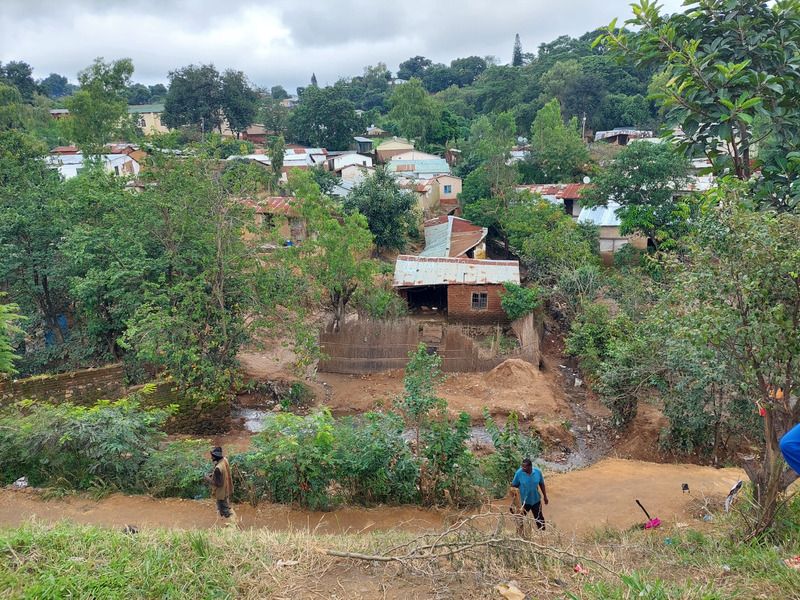
It’s not the first time that the low-lying Shire valley and Phalombe plain has flooded. But the effect on Blantyre’s unplanned and over-crowded slum townships is simply unprecedented.
The first funeral I preached at in Malawi was not far from where so many perished because of cyclone Freddy. A young child had drowned after falling into a slum bafa – a communal un-plumbed bathing area. Thousands of homes are piled on top of each other along the sides of the city’s landmark mountains – Soche, Ndirande, and Mchiru. Most have no form of drainage or sanitation.
It was a disaster waiting to happen.
Yet, Malawians have got used to hardship and disaster. It’s a way of life. Or death.
Before 12 March millions of Malawians were already struggling. As they have done to greater or lesser degrees for most of their lives.
Malawi is presently the 11th poorest country in the world.[1]
In August last year, 3.8 million people were expected to face high levels of acute food insecurity (IPC Phase 3 – Crisis). Almost 6.5 million others categorised as IPC Phase 2 (Stressed) and at needing help to avoid disaster risk and improve their livliehood protection. Experts were already predicting that 21 of Malawi’s 28 Districts would be struggling with food insecurity between October 2022 and March 2023.[2]
That was before Cyclone Freddy.
The reasons are many.
It is true that Malawi lacks the natural resources that many of our regional neighbours are blessed with. In their place, corruption, nepotism and mismanagement abound.
Lack of opportunities and a culture of jealousy conspire to make Malawi an unlikely place for the capable to succeed. Able young people pursue education and opportunity overseas, and understandably never come back. Thus, the brain-drain dooms Malawi to be led by a succession of people not good enough to make it overseas, but clever enough to cheat their way to comfort at home.
On my recent visit, one long-term resident of Malawi complained angrily, “Nothing works in this country! They’ve stolen everything!”
It’s true. The country’s infrastructure is broken down.
You can’t get a driving license in Malawi because they can’t import the plastic cards. And even more seriously, I couldn’t buy coffee beans because the roastery couldn’t find gas!
I know that doesn’t sound like much of a hardship, but think about the business owner who’s losing coffee sales every day because the country is broken.
Or the business owner who wouldn’t even give me a quotation for an irrigation pump, because he’s embarrassed to contact his supplier for a price, knowing there is no foreign exchange in the country to actually buy the pump if I say yes.
So the demand for coffee beans falls, hurting the coffee growers, and the price of maize goes up, because people like us who would grow food in the dry season can’t – even if we could find fertiliser.
And then came Freddy!
Unfortunately, I can’t give you up-to-date statistics. The authorities seem to be overwhelmed and unable to stay current with the numbers. However, it is safe to say that hundreds of thousands of people have been displaced by the extensive flooding and mudslides. In our District (Zomba) alone, there are almost 50,000 people living in evacuation camps because their homes were either destroyed or damaged by the cyclone. Many of them are children and elderly. Around half have received no assistance yet, 3 weeks into the crisis. That is partly because of the sheer scale of the catastrophe. And partly because the network of mostly dirt rural roads can’t cope with the volume of rain which has and continues to fall.
In most cases the camps are nothing more than empty school classrooms. Typically that means bare earth or cement floors and unglazed windows. Many have no bedding and some may even have no change of clothing. The camps are fertile ground for those seeking to exploit vulnerable women and children.



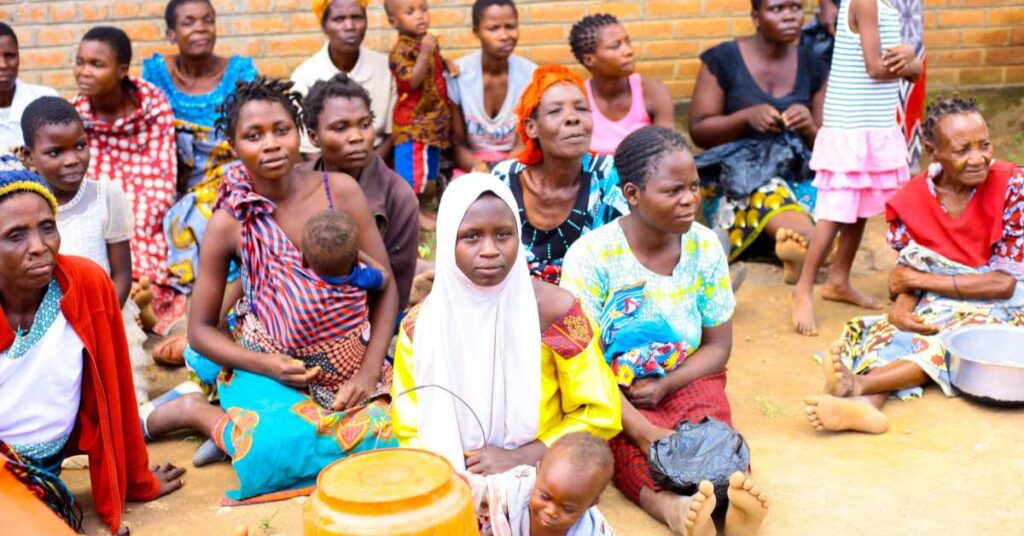
More than a week ago, the total number of displaced households exceeded 114,000 – that’s likely to be over half a million people. These poor, mostly uneducated people, are not responsible for the mismanagement and corruption of their country. They aren’t to blame for coronavirus and they didn’t start the far-away war in Ukraine. But they are certainly paying the price!
As one person wrote to me recently, “We are overwhelmed by a world in need.” It is indeed overwhelming.
I give thanks that our Saviour is never overwhelmed, and I am truly grateful for the grace of his people who continually respond in kindness and generosity. As a result of this kindness we are able to make a small but meaningful contribution to the relief effort.

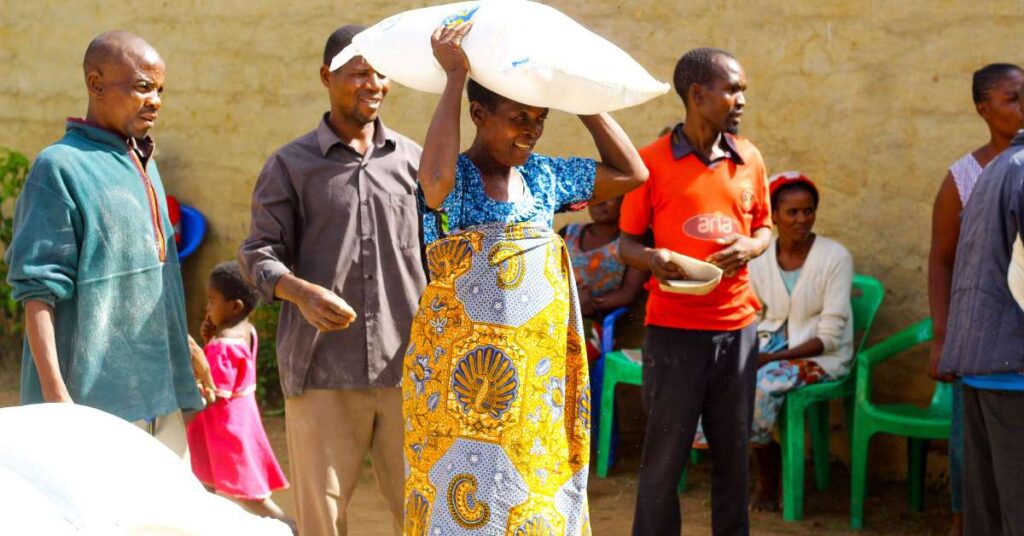

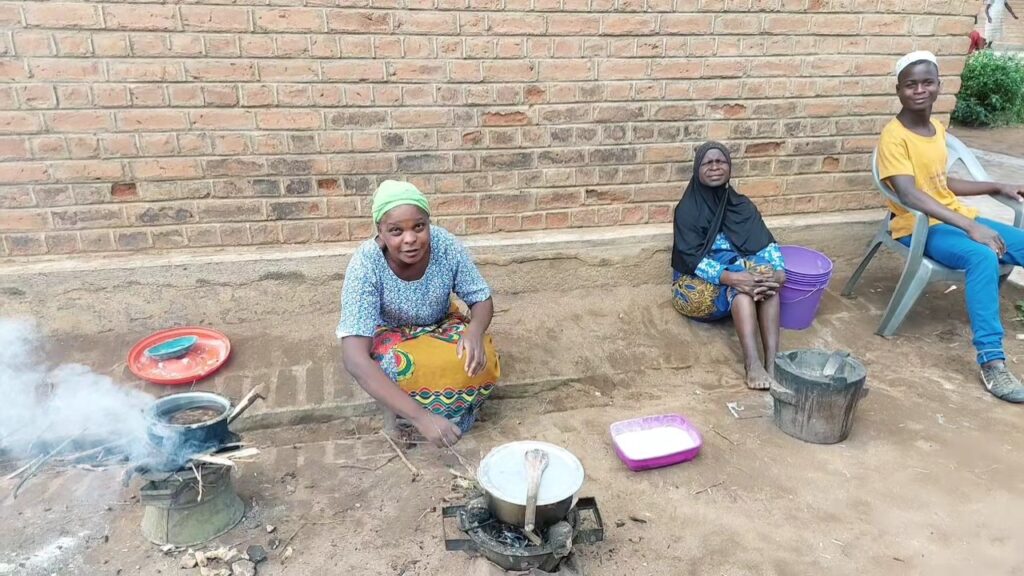
[1] Measured by Gross National Income per capita – https://data.worldbank.org/indicator/NY.GNP.PCAP.CD?most_recent_value_desc=false
[2] https://reliefweb.int/report/malawi/malawi-ipc-acute-food-insecurity-analysis-june-2022-march-2023-published-august-8-2022#:~:text=Between%20June%20and%20September%202022,and%20reduce%20food%20consumption%20gaps.
Tropical Cyclone Freddy claimed the lives of thousands, while hundreds of thousands more have been displaced by the flood and mudslides. SALT is working to relieve need and share the Gospel among a few of them in the Zomba and Chiradzulu districts. We shot this video during our visit to Lisao Camp, approximately 10 days after the cyclone struck.
It seems like every day we hear fresh stories of desperation. We thank the Lord for moving his people to give so that we are able to respond to some of those most in need.
You can read here about SALT’s interim incident response plan.
Reliefweb report: https://reliefweb.int/report/mozambique/southern-africa-tropical-cyclone-freddy-flash-update-no-7-14-march-2023
It’s now two weeks since Cyclone Freddy began to wreak havoc across Southern Malawi. We have been trying to come up with an appropriate incident response plan.
The body count continues to rise. However, it is doubtful if we will ever know the true number of people who perished. Many were washed away by flash-floods or buried in the devasting mud-slides which ripped through the slum townships in Blantyre and elsewhere. A Christian worker known to us through a mutual friend, knows of an entire family of 10 who all perished under one roof.
The need is overwhelming. We have only limited resources.
There are at least three categories of need, and we have decided to respond to each as follows:
In the village group of which Saidi forms a part, around 230 families have experienced total or partial collapse of their homes. Many are still living in what remains of their houses. Some are living with relatives, while others are housed in one of nine camps (mainly in school buildings vacated for the purpose). Some of these camps are in remote areas and very difficult to reach.
We have decided to help two camps in our area, plus a further one in Chiradzulu District, known personally to Brother Harold. We estimate the total number of people to be around 600-800 in total.
Already, we have distributed 30 x 25Kg bags of ufa (maize flour) to Lisao Camp (Chiradzulu), enough for 5KG / family. This will probably be sufficient to survive for 4-5 days. With resources to hand, we believe we can manage to supply a similar amount to the three camps, once every two weeks until the beginning / middle of May.
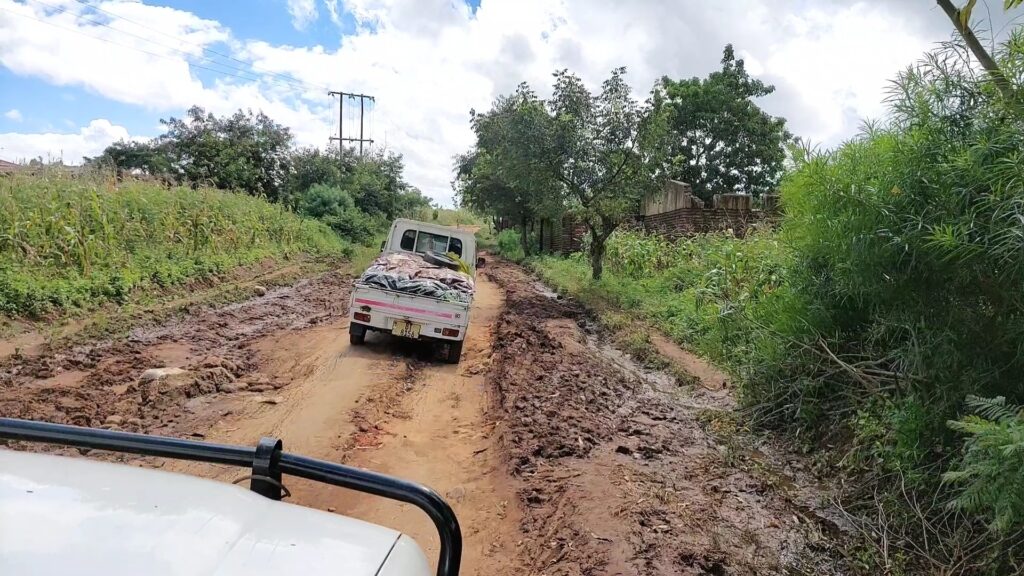


With greater resources we would be able to make more frequent supplies. We could even include other essential items, like blankets, kitchen & cooking utensils, mosquito nets, and water sanitising tablets. However for the time being, this is what we can manage.
We also plan to assist those affected in our immediate community with a one-off supply of a similar (5KG) quantity. Not much. But something.
This does not take into account the needs of many of our literature distributors who have been affected.
It’s impossible to do anything right now about repairing / rebuilding damaged or destroyed homes, as the rainy season has not yet finished. However, by May, people will be starting to think about rebuilding.
The needs will be immense and we will not be able to help all, or even most. Nevertheless, we will try to assist those who are most vulnerable, especially widows and others with no reasonable expectation of help.
Right now, we have no funds to help with rebuilding, as our priority is to feed the hungry. Experience tells us that we can build a simple house to an acceptable standard for around $1000 / £800. That means with cement mortar / plaster instead of mud. How many people we are able to help will depend on what funds are available.
It’s clear that there will be many survivors who have experienced life-change physical and psychological trauma. For example, we are aware of one lady who lost everything, including her husband and children. She was presumed dead, but was dug out alive from the mud. She is in hospital, the skin scraped off the front of her body, needing multiple fractures repaired. The state provides no care for people like that. When she is discharged from hospital, she has only her frail, elderly mother to care for her. We have undertaken to provide for housing and living assistance (and will be happy for any benefactors willing to partner with us in caring for her). There will be many, many more people with similar needs. For a very long time.